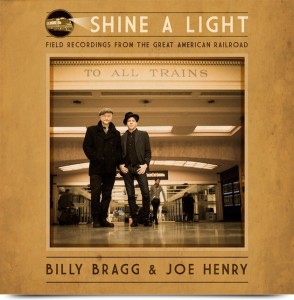 When you speak of the Great American Songbook, you’re usually talking about the so-called standards, penned mostly in the 1930s and ’40s by the likes of the Gershwins, Berlin, Porter, Johnny Mercer, Ellington, et. al., and popularized by Sinatra, Ella Fitzgerald, the Big Bands, etc. But there’s another great American songbook. Its theme is the immensity and grandeur of America, the hardships of working people in that encompassing landscape, and the way people moved around in it looking for work in those same years, mostly. It’s about trains and the people who traveled on them and the reasons they traveled. Its first great bard was Jimmie Rodgers, the Singing Brakeman, but down the years the ranks of artists who’ve sung about American trains have included Hank Williams, Lead Belly, the Carter Family, Glen Campbell, Gordon Lightfoot, Johnny Cash and many more.
When you speak of the Great American Songbook, you’re usually talking about the so-called standards, penned mostly in the 1930s and ’40s by the likes of the Gershwins, Berlin, Porter, Johnny Mercer, Ellington, et. al., and popularized by Sinatra, Ella Fitzgerald, the Big Bands, etc. But there’s another great American songbook. Its theme is the immensity and grandeur of America, the hardships of working people in that encompassing landscape, and the way people moved around in it looking for work in those same years, mostly. It’s about trains and the people who traveled on them and the reasons they traveled. Its first great bard was Jimmie Rodgers, the Singing Brakeman, but down the years the ranks of artists who’ve sung about American trains have included Hank Williams, Lead Belly, the Carter Family, Glen Campbell, Gordon Lightfoot, Johnny Cash and many more.
British folk singer Billy Bragg (“the bard of Barking”) has teamed up with American singer-songwriter Joe Henry to shine a fresh light on that songbook. And the way in which they did it is almost as cool as these two gentlemen and the songs they chose. In March of this year they boarded the Texas Eagle in Chicago’s Union Station and rode it to Los Angeles, through St. Louis, Fort Worth, San Antonio, El Paso, Tucson and to L.A. They stopped at the places named above and set up their recording equipment at trackside and in waiting rooms, and recorded these great American songs.
The end product is Shine A Light – Field Recordings From The Great American Railroad featuring 13 songs they recorded over four days on this 65-hour journey from Chicago to Los Angeles. Its title comes from the chorus of Lead Belly’s “The Midnight Special,” which you can see them perform here:
As you can see, they recorded in situations that gave them lots of ambient sounds from these train stations. It’s billed as a field recording, and the CD captures the immediacy of these live performances. A train whines by as they finish John Hartford’s “Gentle On My Mind,” the noise of the people in the station is a steady backdrop to “The Midnight Special,” a train’s horn introduces Lead Belly’s “In The Pines,” and birds chirp in the dawn chorus as the two singers begin the final number, Gordon Lightfoot’s “Early Morning Rain.” It’s a fine way to end an album that begins with a song that has to have a lot of resonance for Bragg, the traditional “Rock Island Line.” Lonnie Donegan’s skiffle version of that song is the avatar of the folk movement in Great Britain, an inspiration to every musician of The Beatles’ generation.
Many of these songs are similarly familiar — Jimmie Rodgers’s “Waiting For A Train,” the traditional “Railroad Bill,” and of course “John Henry,” though it’s done in a version that is less familiar. Some may be fairly obscure to today’s listener: Jean Ritchie’s “The L&N Don’t Stop Here Anymore,” a sad tale of a dying coal town; the traditional “KC Moan,” previously recorded by the Memphis Jug Band; Woody Guthrie’s “Hobo’s Lullaby,” and the Carter Family’s “Railroading On The Great Divide,” a stirring waltz-time song about building the railroad across Wyoming. “Lonesome Whistle,” one of my favorites here, is one of Hank Williams’ less-known songs. Joe Henry sings the lead on this with his edgy tenor as Bragg sings deep bass harmony.
The recordings lack the kind of punch that a studio can give, so they’ve tried to vary the tempo and playing techniques a bit. They do a nice bit of dual fingerpicking on “L&N,” with Henry providing poignant high harmonies to Bragg’s lead. Bragg really belts out the lead on “John Henry,” and they sing a beautiful duet on “Early Morning Rain.”
They’re doing a brief UK tour in November behind this material, which should be a great show to see. You can learn about it and a lot more on their fabulous multi-media website.
(Cooking Vinyl, 2016)
